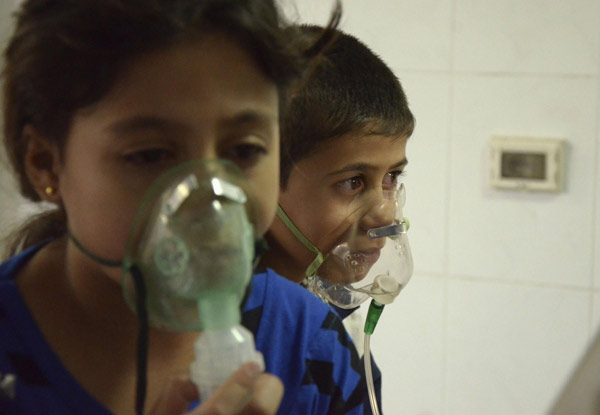

BEIRUT/PARIS - The United Nations demanded Syria give its chemical weapons experts immediate access on Thursday to rebel-held Damascus suburbs where poison gas appears to have killed hundreds just a few miles from the UN team's hotel.
|
 |
|
Children, affected by what activists say was a gas attack, breathe through oxygen masks in the Damascus suburb of Saqba, August 21, 2013. |
There was no sign, however, that scientists would soon be taking samples at the scene of horrors that have drawn comparison with the gassing of thousands of Iraqi Kurds at Halabja in 1988.
President Bashar al-Assad's opponents gave death tolls from 500 to well over 1,000 and said more bodies were being found in the wake of Wednesday's mysterious pre-dawn killer fumes, which the Syrian government insists were not its doing.
Images, including some by freelance photographers supplied to Reuters, showed scores of bodies laid out on floors with no visible signs of injury. Some had foam at the nose and mouth.
Talk, notably from France and Britain, of a forceful foreign response remains unlikely to be translated into rapid, concerted action given division between the West and Russia at Wednesday's UN Security Council meeting, and caution from Washington on Thursday.
Moscow has said rebels may have released gas to discredit Assad and urged him to agree to a UN inspection. On Wednesday, Russian objections to Western pressure on Syria saw the Security Council merely call in vague terms for "clarity" - a position increasingly frustrated Syrian rebels described as "shameful".
On Thursday, UN Secretary-General Ban Ki-moon said Syria must let the UN team already in Damascus investigate "without delay". He said he would send a top UN disarmament official, Angela Kane, to lobby the Syrian government in person.
Ban said he expected a swift, positive answer.
U.S. President Barack Obama has directed US intelligence agencies to urgently help establish what caused the deaths, a State Department spokeswoman said while acknowledging that it may be difficult given the United States does not have diplomatic relations with Syria.
"At this time, right now, we are unable to conclusively determine CW (chemical weapons) use," State Department spokeswoman Jen Psaki told reporters. "We are doing everything possible in our power to nail down the facts," she added.
Former weapons investigators say every hour matters.
"The longer it takes, the easier it is for anybody who has used it to try to cover up," said Demetrius Perricos, who headed the UN's team of weapons inspectors in Iraq in the 2000s.
French Foreign Minister Laurent Fabius said world powers must respond with force if allegations that Syria's government was responsible for the deadliest chemical attack on civilians in a quarter-century prove true. But even Fabius stressed there was no question of sending in troops on the ground.
Britain, too, said no option should be ruled out "that might save innocent lives in Syria". But European forces can do little without U.S. help, and Washington shows little appetite for war.
Obama began a two-day bus trip to promote his domestic economic policies and made no comment on Syria. His spokesman said the tour showed he had "his priorities straight".
Syrian officials have called allegations against their forces "illogical and fabricated". They point to the timing of the attack, days after UN inspectors arrived after months of argument, and to previous assurances that, if they possessed chemical weapons, they would never use them against Syrians.
After months of negotiating with Assad's government to let inspectors into Syria, a UN team arrived in Damascus four days ago. Their task is to check on the presence, but not the sources, of chemical weapons that are alleged to have been released in three specific, small incidents several months ago.
Syria's government, which has accused the rebels of using chemical weapons in the past, offered no public response to calls for wider UN access.